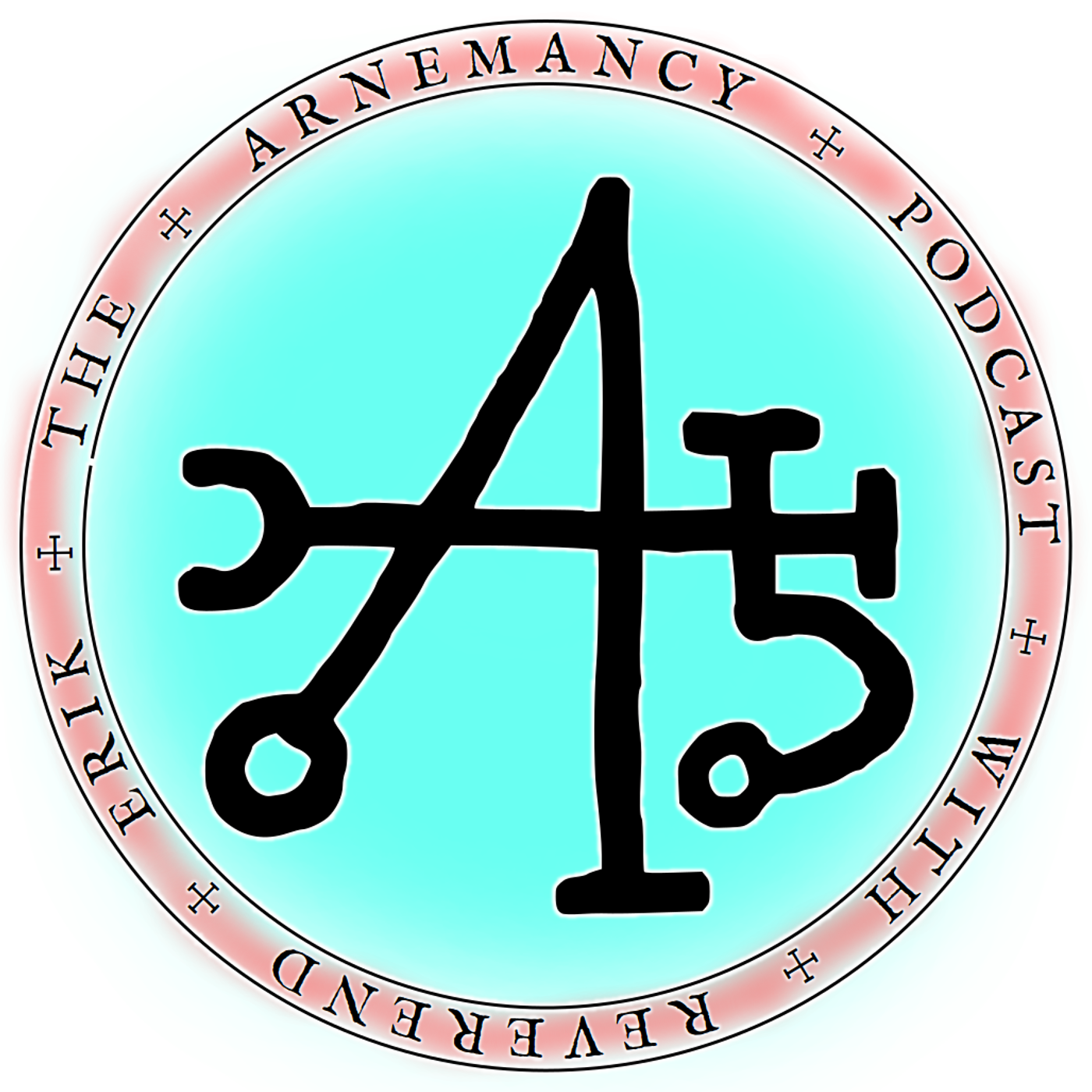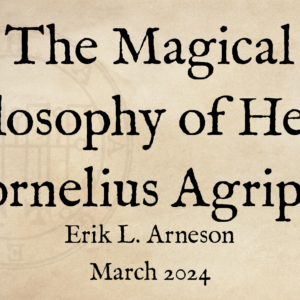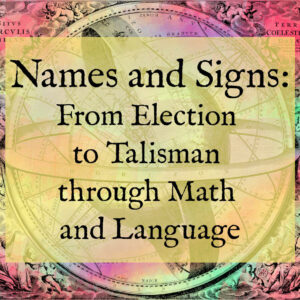The Kybalion serves as an introduction to so-called Hermetic philosophy to many. However, after more study, it is clear that The Kybalion is not a book about Hermetic philosophy at all. It was published in the early 20th century and preaches a philosophy closer to that of the New Thought movement.
What is New Thought?
 The New Thought movement originated in 19th century America, and was originally known by many other names, such as Christian Science and Mental Science. It is a popularized form of self-help psychology, relying on principles such as mind-over-matter and the law of attraction. These principles should be very familiar to readers of the Kybalion, where they are presented as “mental transmutation.” In fact, if you look at the principles espoused by the Kybalion in the context of New Thought philosophy, it is clear that many of its ideas originated there.1
The New Thought movement originated in 19th century America, and was originally known by many other names, such as Christian Science and Mental Science. It is a popularized form of self-help psychology, relying on principles such as mind-over-matter and the law of attraction. These principles should be very familiar to readers of the Kybalion, where they are presented as “mental transmutation.” In fact, if you look at the principles espoused by the Kybalion in the context of New Thought philosophy, it is clear that many of its ideas originated there.1
Learning About Hermetic Philosophy
Hermetic philosophy, or Hermeticism, is based around the teachings of legendary super-mystic Hermes Trismegistus. This philosophical and magical tradition dates back to the first few centuries C.E., and probably has its roots in older Egyptian and Greek teachings. While there is some overlap between the teachings of the Kybalion and Hermeticism,2 there is a great deal more to this tradition. If the Kybalion sparked your interest, there is a whole new world of wonder to be found in the philosophies and teachings of ancient Hermeticism. Let’s look at some books to get you started.
Getting Started
The Corpus Hermeticum is the best collection of actual Hermetic writings, but it’s not an easy book to jump into. Instead, it is easier to start with The Hermetica: The Lost Wisdom of the Pharaohs by Timothy Freke and Peter Gandy. While it glosses over some of the nuances of Hermetic philosophy, it hits all the major points quite well. In addition, the authors make it clear where their inspiration came from, so you’ll know where to look to learn more.
 If you’re more interested in history and how Hermeticism fits into modern philosophy and religion, check out The Quest for Hermes Trismegistus: From Ancient Egypt to the Modern World by Gary Lachman. The author was one of the founding members of Blondie, and has since gone on to write many books and articles about mysticism and the occult. His historical approach to Hermeticism is lucid, easy to follow, and informative.
If you’re more interested in history and how Hermeticism fits into modern philosophy and religion, check out The Quest for Hermes Trismegistus: From Ancient Egypt to the Modern World by Gary Lachman. The author was one of the founding members of Blondie, and has since gone on to write many books and articles about mysticism and the occult. His historical approach to Hermeticism is lucid, easy to follow, and informative.
If you’re interested in learning more about occultism and esotericism in general, check out my list of getting started books.
Getting to the Juicy Parts
 When you feel ready to really explore the meat of Hermeticism, it’s time to turn to the Corpus Hermeticum and other ancient writings, collectively known as the Hermetica. There are two great English translations of the Corpus Hermeticum available today. The first, published as The Way of Hermes, was translated by Clement Salaman and is more poetic without dwelling on the academic aspects. The second is called simply Hermetica, and was translated by Brian Copenhaver. This version includes the Asclepius, another important Hermetic work, but it’s a more challenging read with plenty of notes and commentary. The challenge, however, is worth it.
When you feel ready to really explore the meat of Hermeticism, it’s time to turn to the Corpus Hermeticum and other ancient writings, collectively known as the Hermetica. There are two great English translations of the Corpus Hermeticum available today. The first, published as The Way of Hermes, was translated by Clement Salaman and is more poetic without dwelling on the academic aspects. The second is called simply Hermetica, and was translated by Brian Copenhaver. This version includes the Asclepius, another important Hermetic work, but it’s a more challenging read with plenty of notes and commentary. The challenge, however, is worth it.
Further Learning
You might enjoy this podcast episode with Sam Block that discusses the Hermetica.

There are also good resources on Hermeticism on YouTube, but they can be tough to find. Dan Attrell’s channel, The Modern Hermeticist, has lots of high-quality content. To get started, you might enjoy this introductory video.
Good luck on your quest for knowledge!
This post was updated in October 2017 to replace the list of recommended books.
Did you like this article? My patrons receive new articles five days early. Support my work on Patreon!

Chapel, Nicholas E. “The Kybalion’s New Clothes: An Early 20th Century Text’s Dubious Association with Hermeticism.” Journal of the Western Mystery Tradition 3, no. 24 (March 2013). Accessed February 24, 2016. http://www.jwmt.org/v3n24/chapel.html. ↩
Chapel outlines some of them. ↩
t||t.secret||t.message||t.value)&&!/[^a-zA-Z0-9]/.test(t.secret ↩





Have found full of interesting knowledge
of all the writings, it seems alot about hermetic phylosphy, and related thinking. This is a very interesting subject, I read regularly to keep wisdom sharp.
[…] foundation of many modern esoteric traditions and societies. However, as we have discussed before, it does not accurately represent Hermeticism as it […]
Nice article, I will look for those other books, thanks!
I actually perceived The Kybalion as more of a “scientific” philosophy and the Corpus Hermeticum as gnostic superstitions and/or apologetics; the former seemed concerned mainly with understanding the hierarchy and natural processes of life in the Cosmos and how to gain mental mastery over the mental nature of the Universe, while the latter seemed focused more on the relative/absolute aspects of Good vs Evil, praising God, praising God some more, praise, praise, praise…
If anyone is looking for a book similar to The Kybalion, I suggest The Arcane Teaching by William Walker Atkinson (the same author of The Kybalion). It’s like a great follow-up book which he published 1 year after The Kybalion. The “laws” and principles are essentially repeated yet structured quite differently. The key differences, however, are more in-depth explanations of the Cosmic Day/Night cycle and of the astral planes, and it asserts how the Absolute “God,” or the All, is NOT Mind, as was “erroneously” stated in past occult writings (aka, The Kybalion!) and that it is the Cosmos itself (a World-Brain as it says) which is the one living Mind – this revelation is more in accordance with parts of the Corpus Hermeticum (despite the back/forth idea of the absolute God being Mind or not; the CH does, indeed, contain contradictions!).
I’ve only had a chance to read the one translated by G.R.S. Mead and another unidentified translation or version of the CH. I had already planned to get the one by Copenhaver very soon to see how well it compares!
I have yet to read Initiation Into Hermetics by Franz Bardon, but it’s what is usually recommended to me – especially the most recent translation from the Merkur publishing company. I should also mention A Bardon Companion by Rawn Clark, which is meant to be a follow-up book to IIH.
The Emerald Tablets of Thoth the Atlantean (not to be confused with the extremely short and rather uninspiring/disappointing Emerald Tablet of Hermes) was a quite interesting read; very poetic/rhythmic, which mainly tells the tale of what supposedly happened in Atlantis and afterwards when he settled in Egypt. It speaks an awful lot of the Halls of Amenti and how to avoid being trapped by some demonic Dweller in what I can only assume is a lower astral plane. Also included is a meditation ritual aimed at providing the practitioner with virtual immortality (so that we can live for hundreds of years just like Hermes and other ancient figures supposedly had lived). Not sure if it all has anything remotely to do with Hermeticism, but it was fun to read!
I have a ton of more reading to do, thanks again for the recommendations!
Anyway, even if The Kybalion isn’t 100% genuine Hermetic philosophy, it’s still a wonderful starting place for anyone interested in learning about occultism or mental influence in general. I recently gifted someone a copy of it to be used as a self-help guide! 😉
Yes, I still like the Kybalion for a great introduction to modern occult philosophy. It is a mystical primer for New Thought, which ushered in a huge segment of esoteric thinking, especially in America. Mitch Horowitz has done a lot of work exploring this, so his work is worth exploring, too, if you’re interested in this material.
I get what you are saying, but I very respectfully disagree. The Kybalion is definitely a product of the New Thought movement, but that movement was inspired by the New Testament which had a strong Hermetic influence. Compare the first chapter of John to the Pimander. Also read The Emerald Tablet and read The Kybalion again. It is all the same idea, the Kybalion is simply restating it in 20th century language. Rosicrucianism, Freemasonry, SRIA, HOGD, the original OTO, Thelema, New Thought, Amorc, Wicca, Bardon…it all descends from the same tree, the Hermetic root/DNA. As above, so below. Panentheism. I am a part of the Divine, I and the Father are one. It is all the same. The Kybalion is part of the Hermetic tradition. It didn’t just end with the Corpus Hermeticum. The Kybalion is one of many modern Hermetic books and the reason it is such a classic is because it takes what is obscure and teaches it in language that is much more clear and easier to grasp. There were good books before it and after it, all Hermetic. The New Thought movement is totally Hermetic if you really think about it, minus all the allegories, false blinds, etc.
A close reading of the Kybalion reveals a cosmology which is not only very specific, but departs from the Corpus Hermeticum and late-antiquity monotheism. You can read about the cosmological issues in some of the links in this article. I also drill down into the very different concepts of divinity in the Kybalion and the CH in this article: https://arnemancy.com/articles/hermeticism/the-nature-of-god-in-the-kybalion-and-the-hermetica/
Note that I am not arguing that all of those groups and philosophies you mentioned aren’t related. They certainly are. Definitely Hermeticism influenced the Kybalion, but that doesn’t mean that the Kybalion agrees entirely with Hermeticism. There are a few points in common, but overall, the Kybalion redefined Hermetic philosophy for the 20th century and produced something that is not the same as 19th century Hermeticism, Renaissance Hermeticism, or classical Hermetism. But yes, they are definitely related.
I think people are too judgemental of the Kybalion. Of course, its not a “real” book of hermetic writings, but really, what is? We do not have real evidence that the “real” writings where written by Hermes himself. Hermetism as we know it from the CH is a synthesis of many late-antiquity schools of thought ascribed to Hermes. The same goes for The Kybalion. Both offer useful insights and will not coincide in many respects.
In my view, the longest running wisdom tradition is Platonism. It’s transmission is quite documented. Iamblichus said that Pythagoras and Plato studied the ancient Hermetic pillars in Egypt and thus communicated its wisdom in Greece.
Hey Erik,
I am curious about hermeticism.
I know nothing. I was looking for recommendations on where to start and asked a friend (Matt) and he pointed me to
this article. Thanks!
I think this may be more my speed starting out…
Ha!
The Complete Idiot’s Guide to Alchemy: The Magic and Mystery of the Ancient Craft Revealed for Today (Complete Idiot’s Guides) https://www.amazon.com/dp/1592577350/ref=cm_sw_r_cp_tai_qDAKCbXFHH8MX
Hi Randy! I’m glad you found something. Let me know if there are any questions I can help with!
[…] https://arnemancy.com/articles/hermeticism/what-to-read-instead-of-the-kybalion/ […]
[…] Arnemancy – What to Read Instead of The Kybalion: https://arnemancy.com/articles/hermeticism/what-to-read-instead-of-the-kybalion/ […]
[…] O que ler ao invés do Caibalion […]